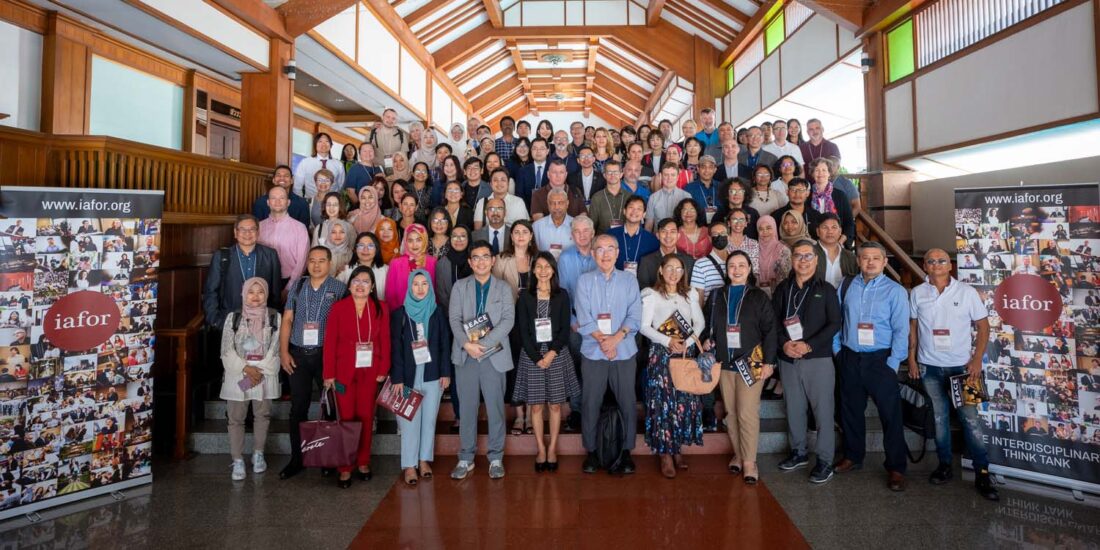The 4th Southeast Asian Conference on Education (SEACE2024) held in Chiang Mai, Thailand, focused its discussions around how to achieve a peaceful and harmonious coexistence within a society that is becoming increasingly diverse and polarised. While there are many facets to this global issue, one case where we can observe the recent rise in violence, marginalisation, and exclusion is an arena that may very well become this issue's remedy - Education.
From hidden school violence to cultural bias, structural and political exclusion, and vulnerability in the face of natural disasters, all keynote speakers and panel presenters highlighted how these issues can be attributed to educational deficiencies—whether agency-wise, structural, cultural, or political in nature—but at the same time, how education itself can change human behaviour and agency, increase resilience, enhance social cohesion, reduce political polarisation, foster sustainability, and abolish cultural bias.
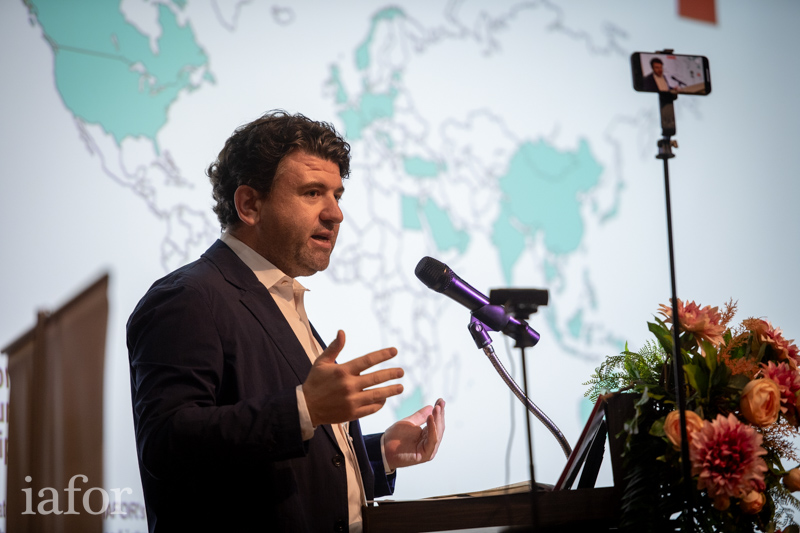
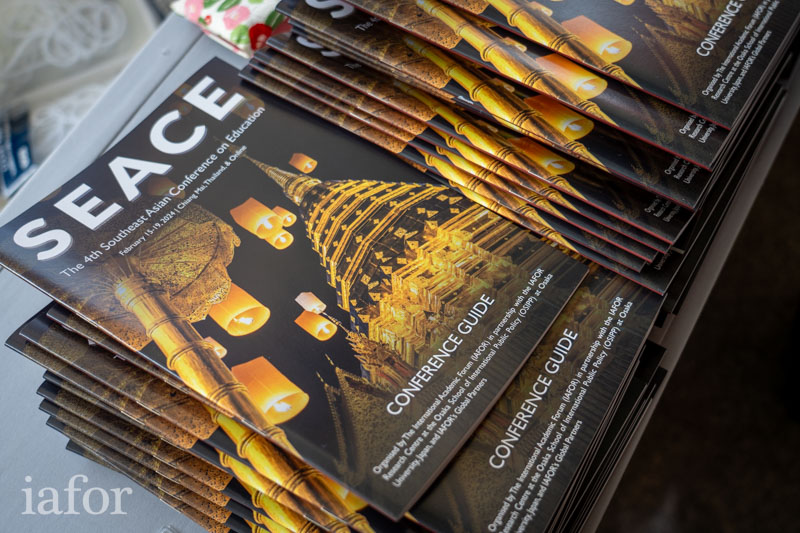
"It doesn't look the same everywhere"
Hostility, exclusion, and inequality take different forms in different settings. Issues in Education can sometimes be structural, cultural, political, or even psychological on an individual level, with each of these forms being found only within certain contexts, and sometimes in combination. The issue of violence is a complex interplay of many factors, which requires careful consideration in regard to each country and culture.
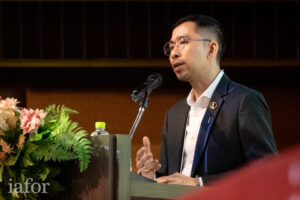
Professor Adisorn Juntrasook, Thammasat University, Thailand
The opening keynote speech by Professor Adisorn Juntrasook from The Faculty of Learning Sciences and Education, Thammasat University, Thailand, titled "Invisible Threats in Education: Addressing Hidden School Violence" emphasises the fact that violence comes in different shapes and forms: how it is expressed and what it expresses. While it can come in the form of physical, psychological, sexual, cultural, structural, or symbolic violence, it can happen anywhere from directly on the school grounds, on the way to or from school, to virtually in cyberspace, and it looks different depending on the socio-cultural context.
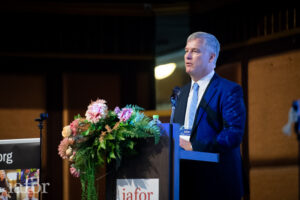
Professor Brendan Howe, Ewha Womans University, South Korea
Brendan Howe from the Graduate School of International Studies, Ewha Womans University, South Korea accentuated the same underpinning thought in his presentation on "Education for Resilience and Self-Reliance in Southeast Asia", where he described how the lack of education and training of social capital affects a society's resilience to natural disasters. Both Myanmar and the Philippines experienced great human loss during natural disasters that occurred in 2008 and 2013 due to improper training and utilisation of human capital, but this lack took different forms in both countries. While in Myanmar, a severely distorted budget allocation towards military dominance ushered in low institutional trust; in the Philippines, the government did not enforce proper disaster preparedness or management education.
Political polarisation can also look differently in different countries, according to Professor Aurel Croissant. In his panel presentation titled "Civic Education and Political Polarisation - Germany, South Korea, and Thailand", he explained that the level and type of polarisation is different in each country based on its socio-political and cultural context, its contested narratives, and how well-developed civil society is in terms of civic understanding, civic skills, values, and action.
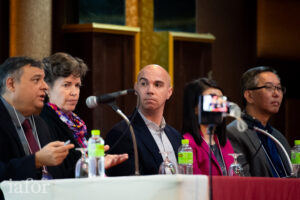
The panel from the University of Hawai’i at Manoa, United States
Access to education is another considerable area of concern that differs in its nature from one socio-cultural context to the next. For example, the University of Hawaiʻi at Mānoa's panel on "Change for Resiliency: Culturally Relevant Education in Asia and the Pacific", led by Dr Michael Menchaca, addressed several geographical and cultural aspects unique to Hawaii that have shaped access to education on the island state. The lack of computer science teachers, for example, as addressed by panellist Dr Daniel Hoffman, has hindered access to computer science education for all students in Hawaii. In the same manner, fellow panellist Dr Peter Leong addressed the geographically dispersed population in Hawaii, which led to limited access to educational opportunities.
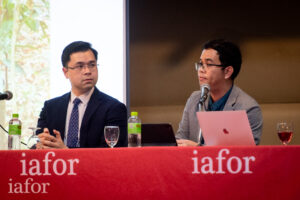
Sahawarat Polahan (Thammasat University) and Dr Sittichai Wichaidit (Thammasat University)
In the case of Thailand, the panel on "Seamless Education in Thailand", led by Dr Sahawarat Polahan (Thammasat University, Thailand) and presented by Dr Nongyao Nawarat (Chiang Mai University, Thailand), Dr Anuchat Poungsomlee (Thammasat University, Thailand), and Dr Sittichai Wichaidit (Thammasat University, Thailand), explained how challenges in access to education were the product of structural and cultural issues instead. A centralised education system has created a division between formal and informal education, central and peripheral education, and division among disciplines. The current one-size-fits-all model has failed to accommodate the students’ needs. Instead, structural constraints rendered teachers unable to pursue adaptive teaching delivery, as demonstrated by the case of students in Chiang Rai who, due to geographical and personal challenges such as their responsibility to take care of the elderly at home, having to work, or having no passion to study, had to drop out of the schooling system.
How do we counter hostility and exclusion to create a peaceful coexistence?
Within an increasingly polarised and diverse setting that is growing more and more intolerant of the "other", what can be done to create a culture of respect, empathy, and inclusivity? The answer is not a "one-size-fits-all" one. Different socio-cultural contexts and different institutional structures create different forms of violence and hostility. Solutions to the problem of violence also differ greatly from country to country. However, social capital and human agency follow similar behavioural patterns in almost all societies that can be educated. The solutions lie therein.
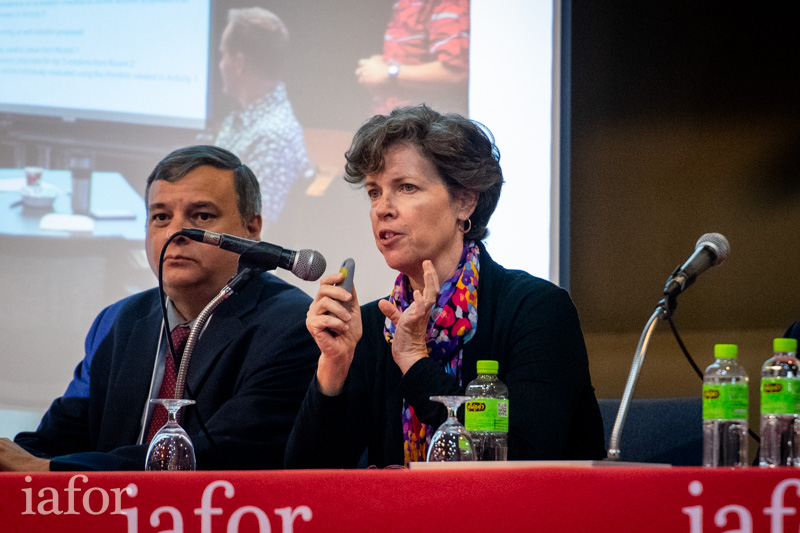
Dr Ari Eichelberger, University of Hawai’i at Manoa, United States
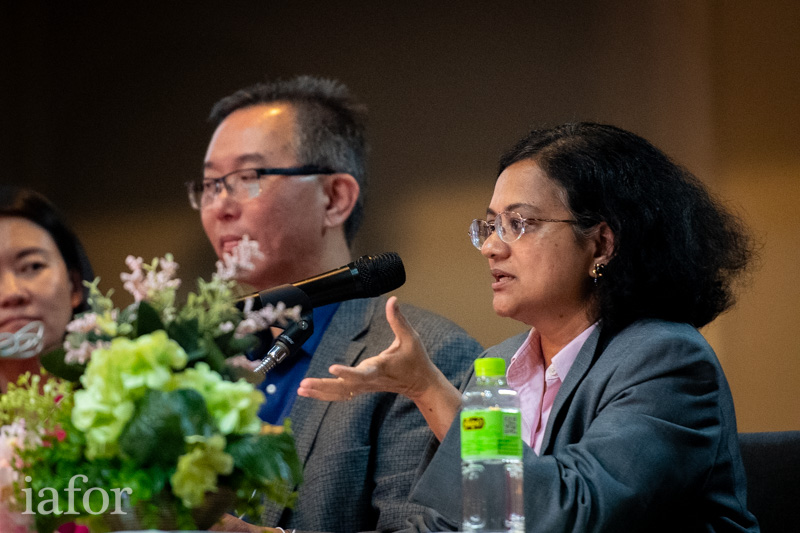
Dr Shamila Janakiraman, University of Hawai’i at Manoa, United States
1. Empathy and human-centric education
- Converting passive observers into active defenders is the key to preventing violence. In most cases of violence at schools, 85% of students are passive bystanders. This can be achieved by raising awareness within school curricula, conducting skill-building workshops (i.e., conflict resolution, communication skills), developing peer support programmes, or creating an anonymous reporting system. Involving students in initiatives against violence can foster a sense of community and responsibility. We should strive to empower them to become part of the solution.
- Developing human-centric teaching models and methods from the design-thinking perspective to enhance interpersonal skills and human interactions in communication and decision-making among faculty members. There are various models which can be implemented such as those presented by Dr Ari Eichelberger and Dr Shamila Janakiraman in their panel, “Change for Resiliency: One Department’s Strategies for Implementing Culturally Relevant Education with a Focus on Asia and the Pacific”. The first model follows the structure of Empathise, (understanding deeply what the issue is), Define the problem, Ideate possible solutions, model a Prototype to solve the problem, and Test the prototype by using the model. Another model, ADDIE (Analysis, Design, Develop, Implement, Evaluate), can be used for designing instructions to tackle problems, tailored to individual identified needs.
- Emerging technologies, notably AI, can make the learning and teaching process impersonal and monotonous. Fellow panellist Dr Chi-Pu Dai suggests developing a ‘human-centred AI’, in which the human is included in the loop of AI creation for relevancy to the learners or users, and to create engaging, personal, meaningful learning experiences.
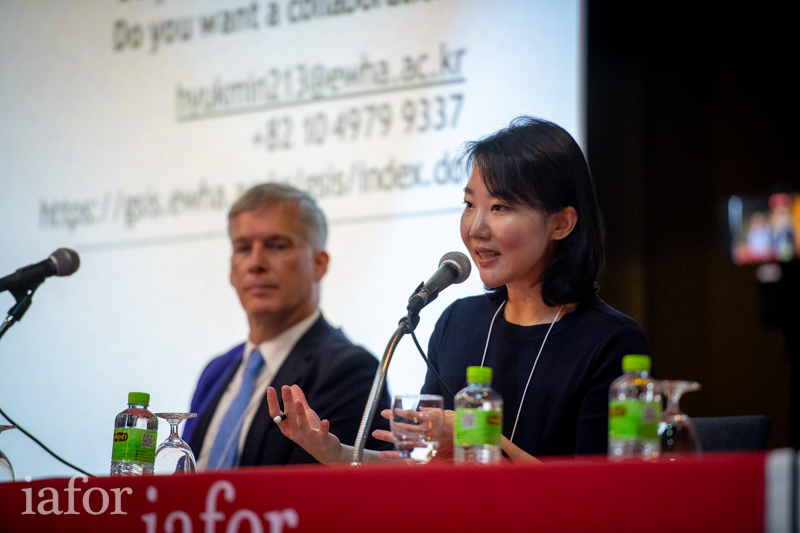
Professor Hannah Jun, Ewha Womans University, South Korea
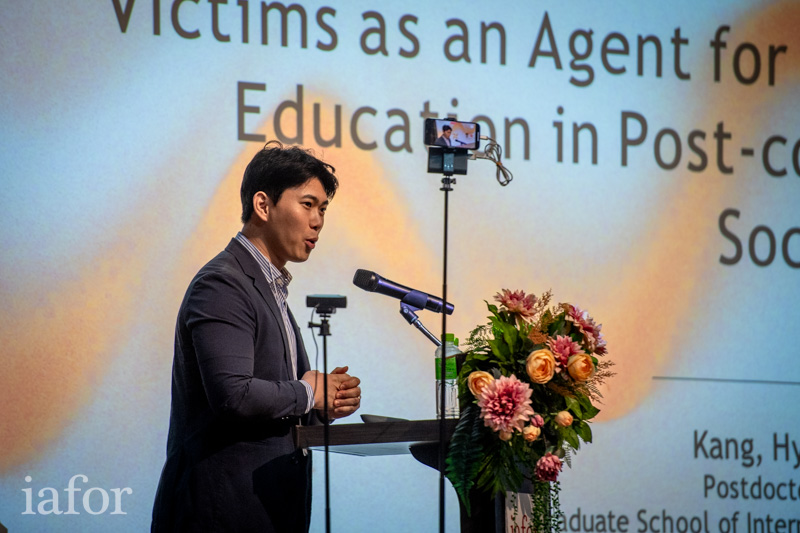
Dr Hyukmin Kang, Ewha Womans University, South Korea
2. Educational reforms concerning curricula and policies
- Incorporate civic education to counter political polarisation by socialising students and creating citizens well-versed in the mechanism of democratic judgement and preference formation. It can educate about how democratic legitimacy is created/eroded, and about the fundamental values of a democratic society. Civic Education involves critical thinking and media literacy, encouraging dialogue, promoting active citizenship, teaching conflict resolution skills, and building social cohesion.
- Incorporate "Sustainability" Education into school and higher education curricula to create a sense of understanding and responsibility for future generations. In her presentation on "Sustainability Education: Case of Inter-University Collaboration for Experiential Learning", Professor Hannah Jun discussed how education should not only focus on knowledge and learning, but also on how to change one's behavioural patterns (e.g. sustainable consumption patterns). She further urged institutions to develop intra- and inter-university collaborations on Sustainability Education.
- Incorporate Peace Education into school curricula using victims as agents and teachers. As demonstrated in an experimental programme titled "Learning from the Victims" presented by Dr Hyukmin Kang during his presentation on "Victims as Agents for Peace Education in Post-Conflict Societies", victims of violence and war shared their stories to students as a way to teach the concept of "peace", and students and victims alike reported higher levels of critical thinking, awareness of social emotions, and social acceptance and resilience.
- To counter the unequal access to education, different solutions apply to different contexts. To make educational access more inclusive in Hawaii, for example, Dr Daniel Hoffman suggests focusing on resilience, defined as the ability for people to acquire basic needs by themselves. The lack of computer engineering teachers can prompt the introduction of computer science courses into local teachers' professional practice. To tackle the program of a geographically dispersed population in Hawaii, Dr Peter Leong suggests introducing online courses and learning experiences, online new student orientations, and virtual graduations. In the case of Thailand, Dr Sahawarat Polahan's panel discusses how educators and experts should also be factored in to contribute to a better educational structure, allowing them to contribute their expertise to fill the gaps in promoting a seamless education experience. A decentralised, informal education structure can encourage teachers to connect to their values, passions, and beliefs to bring out the highest capacity within themselves.
3. The role of governments
- Governments are obligated to protect their citizens from any type of human security crisis, provide basic human needs and build capacity and agency. According to Professor Howe, more focus should be placed on the vulnerable and marginalised.
- On the other hand, Professor Howe also urges governments to build resilience of social capital. Citizens must be trained to acquire basic human needs by themselves in times of crisis.
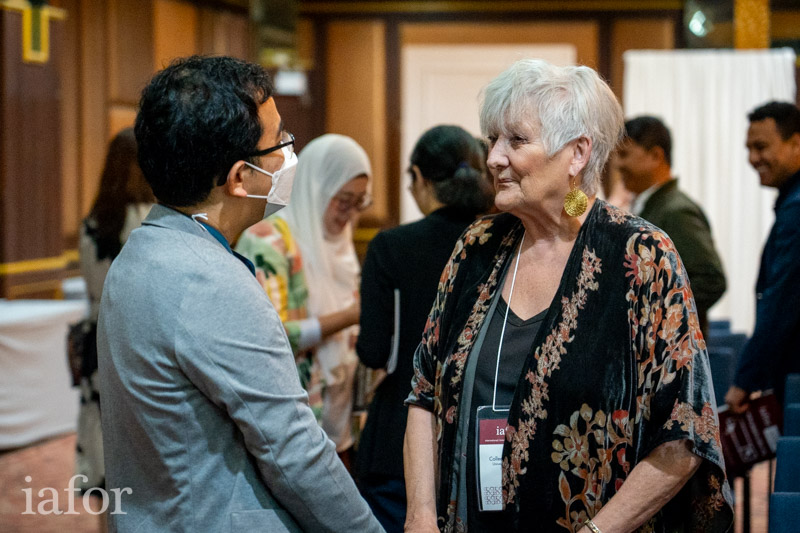
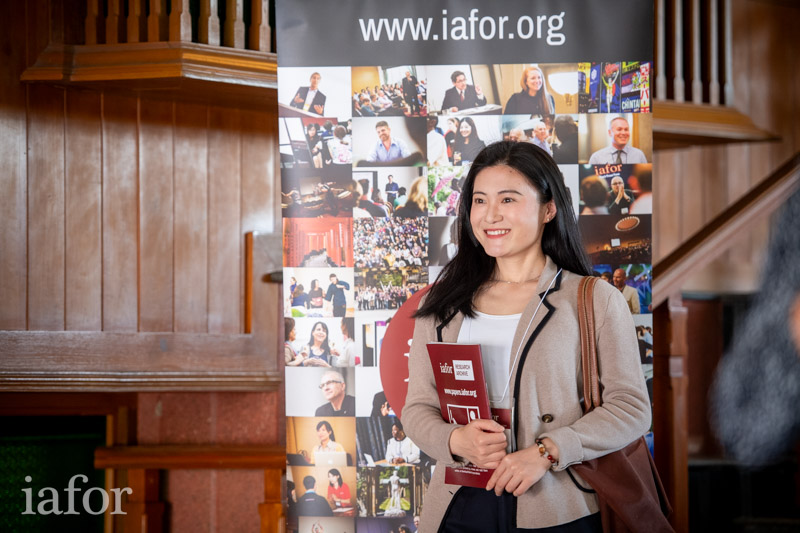
What are the limitations to these solutions?
Creating a peaceful and harmonious society on the foundations of empathy and respect requires time. Solutions to hostility are not an easy fix: they are but long-term endeavours. As such, there are several limitations to the aforementioned solutions.
1. Doing good can be seen as wanting attention or recognition for the younger generations
As a response to an audience member's question on how we can solve the problem of violence, Professor Juntrasook makes a note of this interesting generational difference in values. The societal pattern of "doing good for attention" is mostly seen among Gen Z, wherein doing good is often seen as attention-seeking behaviour and can lead to good-doers becoming victims themselves. This may stem from years of a positive/negative reinforcement type of parenting that has been observed in the past two decades. How to navigate through generational values remains a crucial point.
2. Generational gap
Dr Hyukmin Kang also reflects on this gap in values and relatedness between various generations. Stories of victims from a few decades ago that occurred during a different societal setting may not be relatable for the younger generations. Comparisons need to be made and an understanding of the younger generation's values is necessary.
3. Alternative teaching methods and contents are hard to add to existing curricula
Newly emerging subjects such as Peace Education and Sustainability Education require knowledge and teaching methods that have not yet been used in classrooms. Most teachers are not experts in sustainability or peacebuilding, while teaching tools and methods may differ from the traditional textbook-learning or lecture-giving methods. In the case of using victims' stories as a teaching method, for example, the quality and content depends highly on how victims tell their stories. This cannot always be rehearsed or evaluated beforehand. An innovation of educational methods and practices is needed.
4. Civic education is a paradox
Political polarisation can be countered by teaching Civic Education. A certain degree of political polarisation is healthy within a democratic environment: we need differing views and opinions to have political dialogue. The problem arises when we view our opponent as an enemy and not as a competitor. So, Civic Education should foster a sense of neutrality. However, Civic Education, by definition, is a product of democratic values. No political or democratic way can be truly neutral, as it assumes a certain positioning by definition. Exactly how we can counter political polarisation in a politically/democratically "neutral way" remains a paradox to be solved.
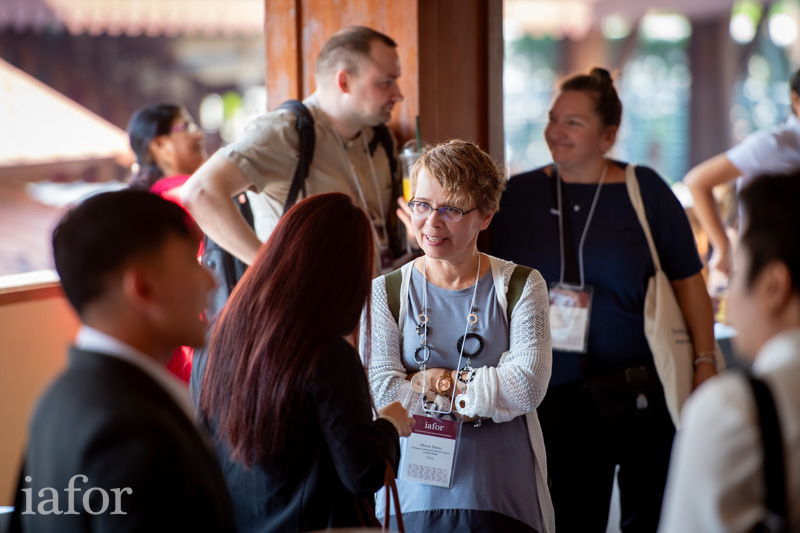
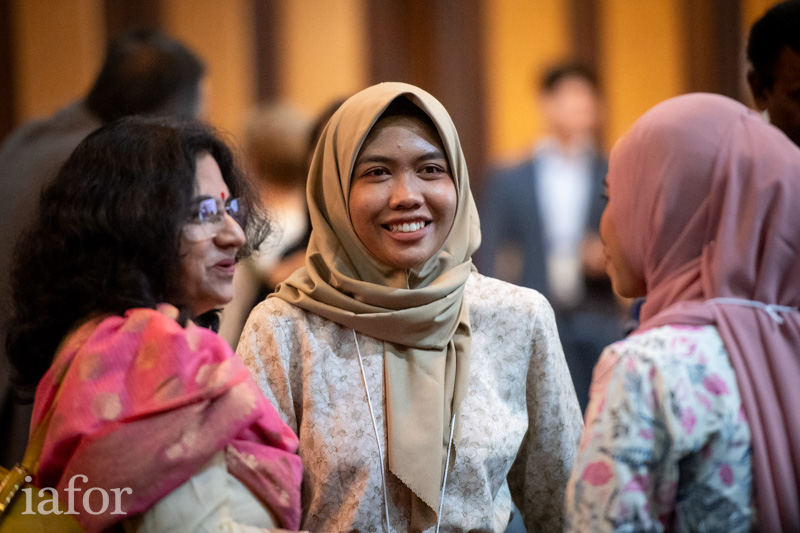
How do we move forward?
The essence: Empowering access to education
Professor Howe offers insight on empowering access to education as the key takeaway from SEACE2024. The conference sessions identified traditional and non-traditional challenges, such as the marginalised groups, gender bias, and other forms of discrimination, as the key obstacles to equal access to education. Despite numerous challenges, solutions offered by the panellists and delegates in efforts to develop new types of distance learning and education delivery provide an optimistic outlook on access to education at the global, national, and local levels.
Dr Juntrasook highlights the role of technology in addressing contemporary challenges in education. The holistic, innovative, and inclusive approach to cater to the learner’s dynamic needs is essential in creating an inclusive and resilient education environment. The discussion at the conference underscored the symbiotic relationship between global insights and local practices. The focus on Thailand, Asia, and the Pacific offers a fresh perspective on Thailand’s unique education challenges, as well as a chance for Thailand to contribute to the global academic community in addressing educational challenges and enhancing student engagement and learning outcomes.
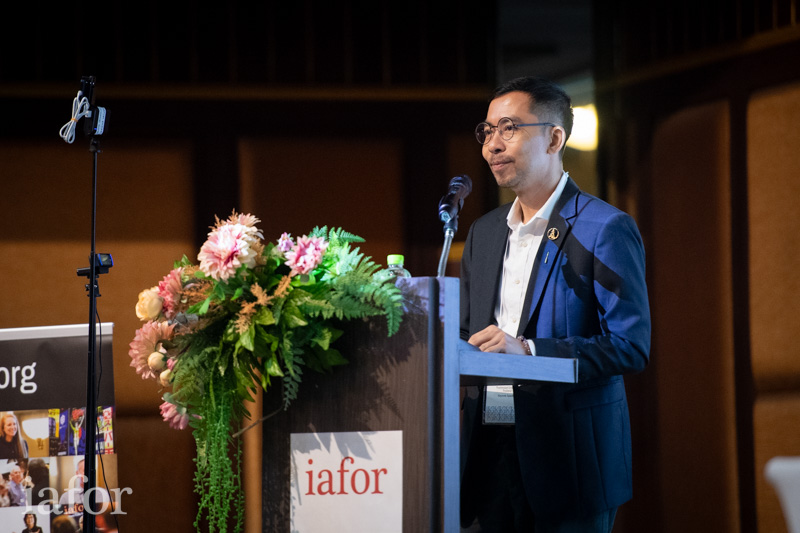
“The discussions revealed a shared commitment to holistic approaches, emphasising not just discipline but also the well-being and inclusivity of educational environments… This exchange of ideas at SEACE2024 underscored the symbiotic relationship between global insights and local practices.”
– Dr Adisorn Juntrasook
The Outlook: Dialogue and interdisciplinarity for social and academic advancement
Dr Juntrasook views the need for continuous dialogue and research on key issues such as multiculturalism, accessibility, and the integration of technology as the current trend for academic discussions on education. The importance of interdisciplinary and cross-cultural collaboration in advancing education research and practice will create the opportunity for further exploration of how traditional educational models can adapt to the rapidly changing global landscape, ensuring that learners are equipped with the skills and knowledge needed to navigate the complexities of the 21st century.
Dr Howe emphasises the importance of interdisciplinarity as a trend of further discussion in the field of education. Future discussions on the contribution of education science to other fields in social sciences and vice versa will yield robustness in academic discussion and discover solutions to the current issues in societies across all levels. Potential outlook includes the importance of education in increasing resiliency, the protection of human rights, and strengthening democracy. Likewise, the field of education could also benefit from the social sciences, such as the contribution of SDGs to education as the governance prescription for more education at the local, national, and global levels.
SEACE2024 reflected upon a promising solution: for educators and policymakers to be more empathetic and resilient towards their learners and co-workers. This will help in identifying problems and suitable solutions tailored to the needs of the students in the local contexts to develop and improve for better learning and teaching experiences.
“The way that I see going forward is the way education can contribute to advancing progress in other areas of social sciences... it increases resilience, it increases the protection of human rights, it strengthens democracy... The other area is how the other aspects of social sciences can contribute to the promotion of education… at the global level, national level, and local level.”
– Dr Brendan Howe
Conference Statistics
Delegate World Map & Country Breakdown
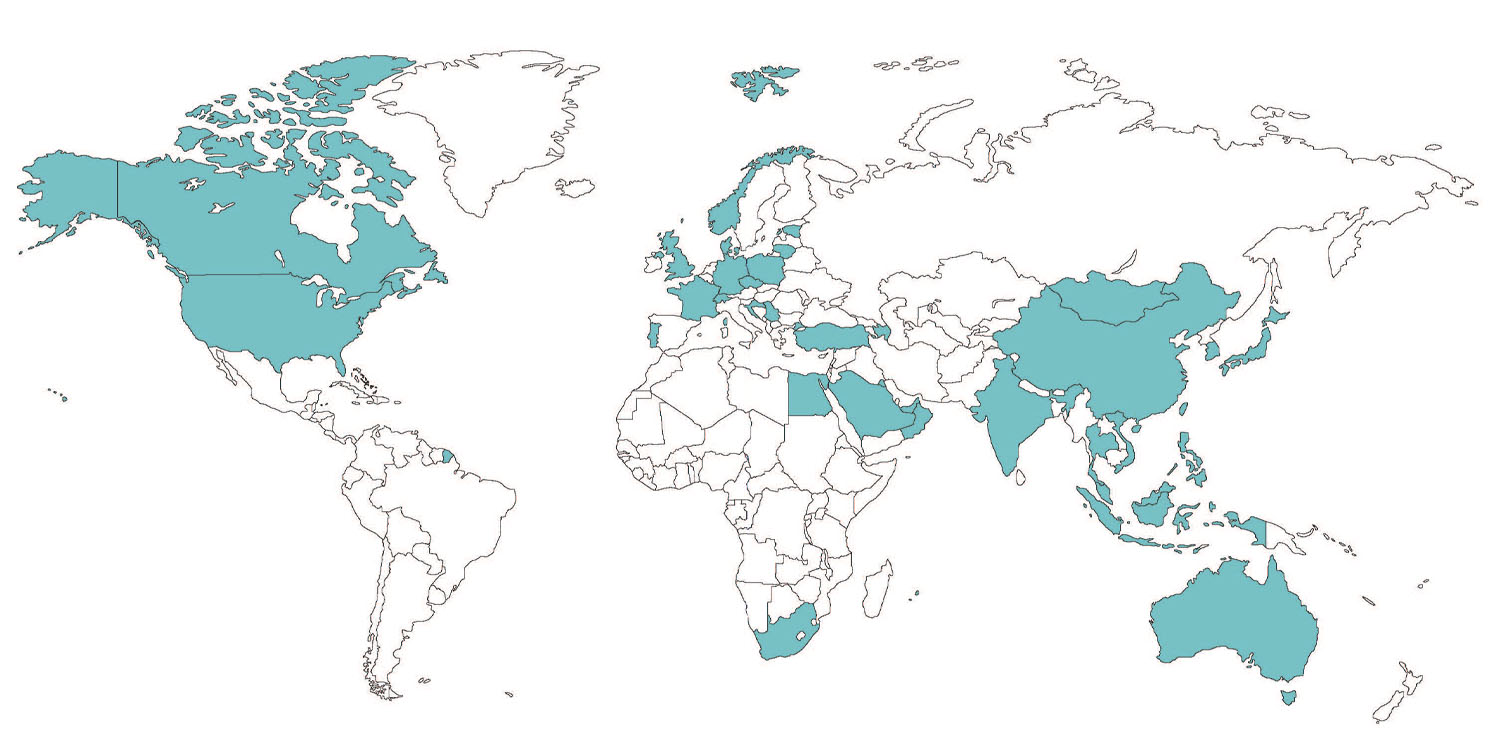
Total Number of Attendees: 221
Total Number of Countries Represented: 40
| Country | Count |
|---|---|
| Japan | 40 |
| Philippines | 30 |
| United States | 24 |
| Thailand | 16 |
| Indonesia | 13 |
| South Korea | 11 |
| South Africa | 8 |
| Taiwan | 7 |
| Hong Kong | 7 |
| China | 6 |
| Singapore | 5 |
| United Arab Emirates | 5 |
| Vietnam | 5 |
| India | 4 |
| Croatia | 3 |
| Saudi Arabia | 3 |
| Canada | 2 |
| Egypt | 2 |
| Kuwait | 2 |
| Country | Count |
|---|---|
| Lithuania | 2 |
| Macau | 2 |
| Norway | 2 |
| Oman | 2 |
| Poland | 2 |
| Portugal | 2 |
| United Kingdom | 2 |
| Australia | 1 |
| Azerbaijan | 1 |
| Czech Republic | 1 |
| Denmark | 1 |
| Estonia | 1 |
| France | 1 |
| Malaysia | 1 |
| Mauritius | 1 |
| Mongolia | 1 |
| Morocco | 1 |
| Serbia | 1 |
| Switzerland | 1 |
| Turkey | 1 |

